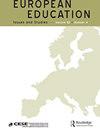治理与演变中的全球教育秩序
IF 0.9
Q4 EDUCATION & EDUCATIONAL RESEARCH
引用次数: 2
摘要
现在,人们普遍认为,教育和学校教育正在由远远超出民族国家控制的力量和行为者(重新)表达。一股主导力量是企业,它们对市场拓展和利润积累的关注正在改变教育的内容和过程。在这方面的典范是跨国公司(MNCs)的作用,如麦肯锡公司,劳瑞德教育公司,培生集团。例如,剑桥国际或兰德公司(Verger et al., 2016)。其他力量是超国家的,由“国际合作”的政治哲学驱动(Karns & Mingst, 2010)。在这里,熟悉和合法的机构和组织反映了政治和文化的愿望和承诺,并很好地重塑了远远超出文化介导的国家和地方社区边界的学习机构。这些组织包括区域性组织,如欧盟、阿拉伯联盟、美洲国家组织或非洲联盟,以及政府间组织,如联合国教科文组织、世界银行、经济合作与发展组织(经合组织)或欧洲委员会。另一股力量体现在日益壮大的志愿或慈善部门。在这方面,新的捐助者(如开放社会基金会、比尔和梅林达·盖茨基金会)以反映关键精英参与者的特殊观点和利益的方式,显著地塑造了长期以来的发展优先事项(Verger等人,2016)。与慈善事业密切相关的是“跨国公民社会的雏形”(McGrew, 1992,2010)——一种由大量非政府组织、倡导网络、智库和学习社区组成的社会形式,它也试图调节或干预全球和地方教育事务。我们正在见证一个新的、更积极的国家的到来,而不是这个不断发展的全球教育治理综合体标志着“国家的终结”。显然,旧的威斯特伐利亚领土主权国家概念——国家有权在自己的领土空间内统治,不受外部干涉,包括教育领域——正在被取代和转变,但绝不是结束,特别是在教育领域(Lingard, 2019)和文化领域(Appadurai, 2006)。由于受困于不断扩大和重叠的跨国教育治理网络,各国现在宣称自己的主权是一种谈判工具,在这种谈判中,权力在一系列全球、地区和地方行动者、进程和机构之间进行交换、共享和分配。因此,学校教育、学习和教育组织都处于过渡和发展之中。在这种不断发展的治理和教育的新地形中,我们可以感受到一种新的研究议程,它超越了目前框架学术的许多方法论和理论“主义”(Dale & Robertson, 2009)。人们感兴趣的一个特定领域是新的治理方法和系统的兴起和影响。这包括对“大数据”在教育中的应用的历史和当代分析,以及关于测量、绩效和监督系统的新发展(例如,Ball, 2017;草坪上,2013;Lindblad et al., 2018)。从国家、地区和全球的角度来看,这些新的可见性制度是如何(重新)塑造教育和受过教育的人的概念的?学术界关注的另一个领域是分析由于新的国际和跨国治理方法和系统而正在出现或已经出现的新的教育“空间”(例如卡尼,本文章由计算机程序翻译,如有差异,请以英文原文为准。
Governance and the Evolving Global Education Order
It is now broadly accepted that education and schooling are being (re)articulated by forces and actors that are well beyond the control of national states. One dominant force is corporate where concerns for market reach and profit-accumulation are changing both the content and processes of education. Exemplary in this regard is the role of Multinational Corporations (MNCs) such as McKinsey & Company, Laureate Education Inc., Pearson plc., Cambridge International or the RAND Corporation (Verger et al., 2016). Other forces are supranational and driven by the political philosophy of “international cooperation” (Karns & Mingst, 2010). Here, familiar and legitimate bodies and organizations reflect political and cultural desires and commitments and are well placed to reshape institutions of learning far beyond the culturally mediated boundaries of the nation and local community. These include regional bodies such as the European Union, the Arab League, the Organization of American States or the African Union, and intergovernmental organizations such as UNESCO, the World Bank, the Organization for Economic Co-operation and Development (OECD) or the Council of Europe. Yet another force is manifest in a growing voluntary or philanthropic sector. Here, new donors (e.g., Open Society Foundation, The Bill and Melinda Gates Foundation) have significantly shaped long-held development priorities in ways that reflect the idiosyncratic views and interests of key elite actors (Verger et al., 2016). Closely related to philanthropy is “an embryonic transnational civil society” (McGrew, 1992, 2010)—a form of society consisting of a plethora of nongovernmental organizations, advocacy networks, think tanks, and communities of learning—which also seeks to regulate, or intervene in, global and local educational affairs. Rather than this evolving global education governance complex signaling an “end of the state,” we are witnessing the arrival of a new, more activist, state. Clearly, the old Westphalian conception of territorially sovereign statehood—the entitlement of states to rule within their own territorial space without external interference including the domain of education—is being displaced and transformed, but is by no means over, especially in the fields of education (Lingard, 2019) and culture (Appadurai, 2006). Locked into thickening and overlapping webs of transnational governance in education, states now assert their sovereignty as a tool of negotiation where power is bartered, shared, and divided amongst a range of global, regional and local actors, processes and institutions. Schooling, learning and the organization of education are thus in transition and on the move. Within this evolving new topography of governance and education, we can sense a new agenda of research that extends beyond the many methodological and theoretical “isms” that currently frame scholarship (Dale & Robertson, 2009). One specific area of interest has been the rise and implications of new governance methods and systems. This has included both historical and contemporary analyses of the application of “big data” to education as well as new developments regarding measurement, performance and surveillance systems (e.g., Ball, 2017; Lawn, 2013; Lindblad et al., 2018). How are these new regimes of visibility (re)shaping notions of education and the educated person in national, regional and global terms? Another area of scholarly concern has been the analysis of new educational “spaces” that are emerging or have emerged as a result of new international and transnational governance methods and systems (e.g., Carney,
求助全文
通过发布文献求助,成功后即可免费获取论文全文。
去求助
来源期刊

European Education
EDUCATION & EDUCATIONAL RESEARCH-
CiteScore
1.20
自引率
0.00%
发文量
5
期刊介绍:
uropean Education is published in association with the Comparative Education Society in Europe (CESE). It is an international peer-reviewed journal devoted to original inquiries and dialogue on education across the member states of the Council of Europe. Established in 1969, the journal features articles on education in individual member states, comparative studies on education across Europe, as well as the impact of European education initiatives globally. The journal especially encourages theoretical and empirical studies, interdisciplinary perspectives, and critical examination of the impact of political, economic, and social forces on education. European Education includes reviews of books and educational films, including those published/produced in English and other languages.
 求助内容:
求助内容: 应助结果提醒方式:
应助结果提醒方式:


